 Investment Intelligence When it REALLY Matters.
Investment Intelligence When it REALLY Matters.
CNBC "Expert" Carter Worth Exposed as a Contrarian Indicator
In addition to receiving world-class investment education, subscribers to our Securities Analysis & Trading Webinar series have benefited a great deal from the investment recommendations and insights provided by Mike Stathis.
We have not previously shown the long list of profitable recommendations from this webinar series because we simply don't have the time.
Besides, we don't feel the need to devote time to this endeavor because anyone who has carefully examined Mike Stathis' 17-year track record of investment analysis and forecasting already knows he publishes the highest level investment analysis and insights which are most often quite profitable.
We believe his research and track record is amongst the best in the world. Mike Stathis has risen to become one of the very best investment analysts in the world, so he doesn't need to keep showing proof.
If you do not agree then you haven't examined his track record.
Mike Stathis' credentials and an overview of his investment research track record can be found here, here, here, and here.
Mike Stathis' unmatched track record of having predicted the 2008 financial crisis enabled investors to capture massive profits.
Evidence of this claim may be found here, here, here, here, here, here, here, here, here, here, here, and here.
So instead of spending our time constantly proving what Mr. Stathis has already proven through years of published research, we prefer to devote to devote this time to investment research, education, and to expose the countless charlatans that continue to fleece the investment public from the financial media to YouTube and elsewhere on the Internet.
But today we wanted to show a recent example of one of our recommendations only after having been informed from a research subscriber that one of CNBC's "experts" recently recommended to sell the same stock we recommended to buy.
As you already know, the stock is Macy's (M).
Subscribers of our Securities Analysis & Trading Webinars have made excellent returns following recommendations to buy and sell shares of Macy's (M) over the past several years.
This time was no different.
On September 29, 2023, subscribers to the 2023 Securities Analysis & Trading Webinar series were instructed by Mike Stathis to accumulate Macy's (M) at the $11 mark.
In constrast, one of CNBC's regular "experts" recently recommended to sell Macy's.
On November 13, 2023 this "expert" Carter Worth warned CNBC's audience that shares of Macy's (M) were headed for a collapse after its upcoming earnings report.
This dire warning from CNBC "expert" Carter Worth came only a couple of days before Macy's (M) was scheduled to announce its quarterly earnings report.
Worth expected shares of Macy's (M) to approach the 2020 COVID pandemic lows of less than $5/share.
In other words, this so-called "expert," Carter Worth warned CNBC's audience that Macy's (M) was going to collapse by more than 55% from $10.74/share (the price of Macy's (M) at the time he made his sell recommendation).
First of all, let me remind you that CNBC has no business airing anyone who recommends betting against any stock based on short-term issues.
That's not investing. It's gambling.
And it creates a gambling mindset.
This is precisely the objective of CNBC and all other financial media platforms because they seek to lure more dumb money into the stock market from which Wall Street takes.
It's important to remember who funds the operations of the financial media.
It's not you. It's Wall Street via advertisements.
This alone sends a very clear message that all financial media should be avoided.
Unfortunately for investors foolish enough to pay attention to the financial media and their "experts," Macy's (M) reported a strong earnings beat causing shares to soar from $10.74 (the price of M when Worth recommended to sell it) to a high of $15.06 at the market open on November 16, after the strong earnings beat was reported.
If you listened to Carter Worth and sold Macy's (M), you lost gains of 40%.
Note that some people who believed Worth's charting bologna shorted Macy's (M) thinking they could make some fast, easy money.
Of course, they too were burned badly.
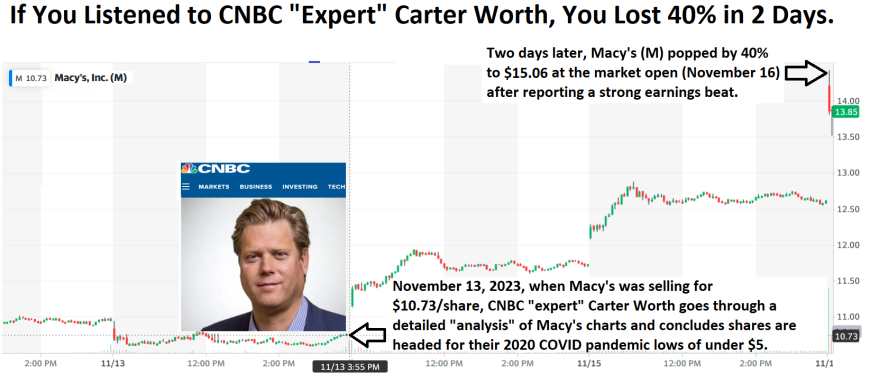
Let's examine Mr. Worth's bio posted on CNBC's website to determine if he has solid credentials.
We want to know if Carter Worth is really an expert, as CNBC claims.
First, Carter Worth boasts 32 years of experience on Wall Street.
Aside from the fact that I could argue (and easily win) that he doesn't have anywhere close to 32 years of experience on Wall Street, what really matters is whether you know what you're doing.
You can have 30 years experience on Wall Street and still be wrong most of the time. For example, consider the case of Peter Schiff, Jim Rogers, or Jim Cramer.
Moreover, "Wall Street" is a generic term that's often loosely applied.
We need to take a close look at where he worked.
And then we need to obtain an understanding of his role(s) at these firms.
To assist in this process, we're also going to check his FINRA record.
Here's the bio of CNBC "expert" Carter Worth.
"Carter Braxton Worth, a 32-year Wall Street veteran, is the CEO/Founder of Carter Braxton Worth Charting LLC. He was Head of Technical Analysis at Cornerstone Macro Research beginning in 2016. Prior to his role at Cornerstone, he was Chief Market Technician at Sterne Agee (acquired by Stifel Nicholas) and at Oppenheimer Holdings Inc."
We'll get back to the first part of his bio (above) later.
For now, I want to focus on the start of his career, so let's look at the next portion of his bio.
"He began his career at Donaldson, Lufkin & Jenrette as a portfolio strategist reporting to Eric T. Miller, Chief Investment Officer and Chairman of the Investment Policy and Stock Selection Committees. It was at DLJ where Carter met his mentor, Vincent Roland Boening, one of the longest publishing technical analysts on Wall Street, whose work began in the Fidelity Chart Room in the 1960′s."
Mr. Worth claims to have entered the industry starting off as a "portfolio strategist." And he claims that he reported to the CIO of the firm.
First of all, we are not sure what a "portfolio strategist" is. This term, although relatively new, is not used much. It can basically mean whatever you want it to mean.
However, we assume Mr. Worth is using this terminology to designate an individual who designs investment portfolios using asset allocation models based on specific investment and risk chartacterisitics.
We do not believe the term "portfolio strategist" was in use 30 years ago when Mr. Worth worked at DLJ. Therefore, we suspect Mr. Worth is attempting to pad his bio in order to make it appear that he was something he was not. But this is mere speculation on our part.
In addition, unless Mr. Worth had extensive experience, there's no way he would be permitted to design investment portfolios.
No firm would let a rookie do that.
It's a major compliance issue. This is common knowledge in the industry.
We see no indication that Mr. Worth had extensive experience in the industry during the period he worked for DLJ.
In fact, his FINRA record shows the opposite.
He only worked at DLJ for about 10 months.
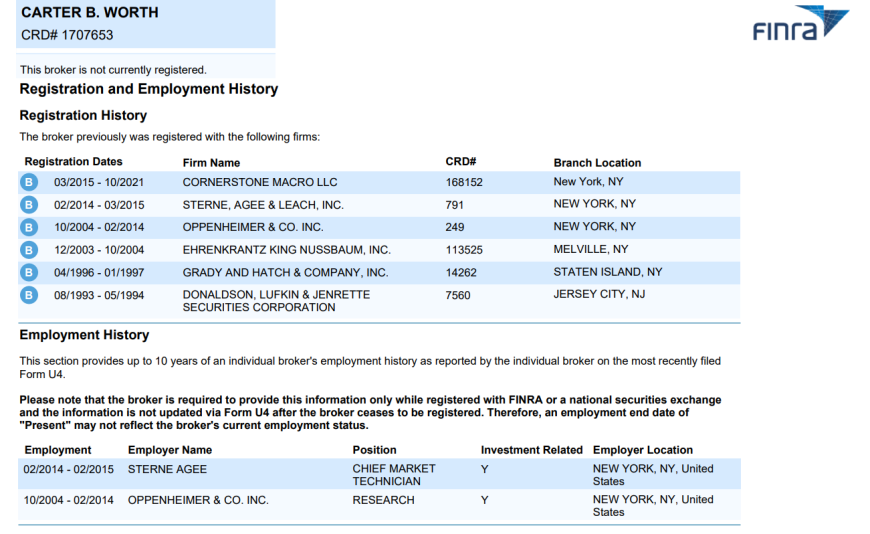
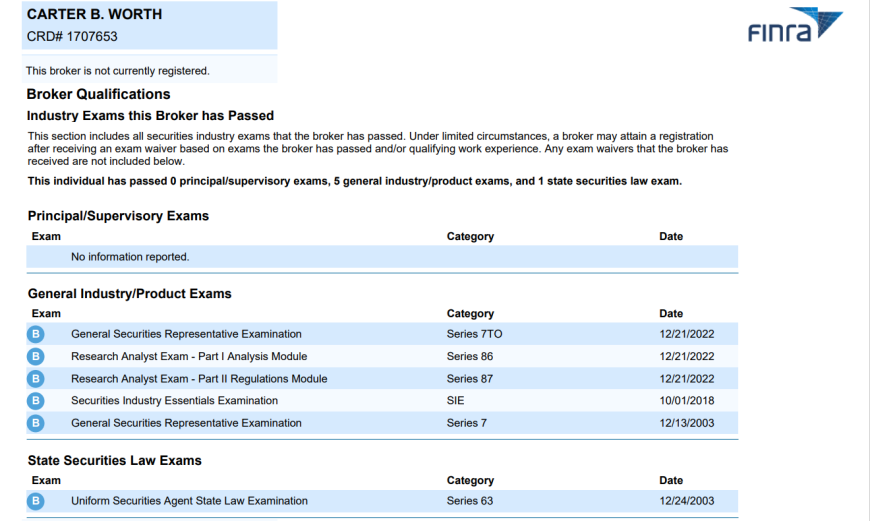
Second, when one begins their career on Wall Street they enter a training program which typically lasts from between two to three years, depending on the position.
No CIO is going to meet with a trainee on a regular basis. That's just ridiculous. Therefore, we believe Carter's claim that he reported to the CIO to be fluff.
Mr. Worth worked for DLJ for only 10 months.
And remember that this was his first job on Wall Street. He was a rookie.
And he did not even complete a training program when he departed for another firm.
Yet, from his bio he creates the impression that he was an important figure at DLJ because he "reported to the CIO."
Furthermore, given that his next employer, Grady and Hatch and Company appears to have been a small boiler room, there's a good chance Mr. Worth was fired from DLJ, or else "asked to leave." But this is mere speculation on our part.
According to FINRA records, Grady and Hatch and Company was expelled in 2002 for failure to pay out arbitration awards. Mr. Worth is listed to have been employed by this firm for only 10 months and left by 1997.
Mr. Worth was not employed by a FINRA registered firm for seven years after he left Grady and Hatch and Company. And we do not know what he was doing during this time. It does indeed raise yet another red flag.
By the end of 2003, Mr. Worth began working for Ehrenkrantz King Nussbaum, Inc. According to FINRA records, he worked there for 10 months.
We do not see any information from his FINRA record that indicates any role he may have had at this firm.
He may have simply parked some kind of securities license there in order to prevent it from expiring, but we are skeptical of this scenario given that his FINRA record does not show that he held any securities licenses during that period.
Incidentally, Ehrenkrantz King Nussbaum, Inc. was expelled by FINRA in 2012.
By 2004, Mr. Worth was working at Oppenheimer. It turns out that according to FINRA records, Mr. Worth's role at Oppenheimer was listed as "research," which could mean many things.
According to FINRA records, Mr. Worth did not hold an analyst license at the time he was employed at Oppenheimer. On the other hand, you do not need a license to serve as a technical analyst.
According to his bio, he was the "Chief Market Technician" at Oppenheimer.
"He was Head of Technical Analysis at Cornerstone Macro Research beginning in 2016. Prior to his role at Cornerstone, he was Chief Market Technician at Sterne Agee (acquired by Stifel Nicholas) and at Oppenheimer Holdings Inc."
Mr. Worth worked at Oppenheimer for nearly 10 years. This is the firm where he spent by far the most time. Thus, we would expect him to list some accomplishments from his time there, but he has not listed anything.
After Mr. Worth's time at Oppenheimer, he worked for Sterne Agee, where he states he also served as "Chief Market Technician."
According to FINRA records, Mr. Worth did in fact work at Sterne Agee as Chief Market Technician, but only for about 13 months. His bio states that Sterne Agree was acquired by Stifel Nicholas.
Sterne Agee was located in Birmingham, AL and had ties to Brazil and Argentina. The firm faced dozens of regulatory penalties and several arbitration claims.
Mr. Worth departed for Cornerstone Macro Research by March 2015 after Sterne Agee was acquired. Our guess is that his job was not going to be retained after the acquisition by Stifel Nicholas, so he left.
Cornerstone's SEC registration status was terminated in 2022, which explains why Mr. Worth decided to start his own firm in late 2021.
So far, Mr. Worth's work history sounds a bit shady. He worked for (at least) two firms that were later shut down by FINRA.
And many of the claims listed on his bio seem suspect.
After all, Carter Worth was a "Chief Market Strategist" for over a dozen years at two firms, where are samples of his research?
Why not show his previous work?

Let's continue with Mr. Worth's bio.
"Carter’s work is based on the principles of collective wisdom and behavioral science, with a particular emphasis on price-volume, correlation, and pattern recognition."
This is a basic description of technical analysis. Thus, it's a bit odd that he would post this statement given that he holds himself out as a technical analyst unless he knows his audience is really completely clueless.
"Carter is a regular guest on CNBC where he is also Co-Host of Options Action; he has appeared on Bloomberg TV, BNN and The Nightly Business Report and has been quoted in publications such as The Wall Street Journal and Barron’s."
One of Mr. Stathis' golden rules for spotting clowns and cons is to note when a person boasts about their media appearances. This is done in order to create instant credibility among naive people, since most people actually believe that the media is credible and only features legitimate professionals. This assumption is incorrect, as Mr. Stathis has been proving for nearly two decades.
When you have nothing to show for, such as a solid track record of performance, or even publications from your many years as a "Chief Market Technician," you'll post your media appearances in order to distract from what's really important...results.
"Each year since 2008, he has appeared on Institutional Investor’s All-American Research team, ranked as one of the Top 3 technical analysts on Wall Street."
These lists are about as credible as Forbe's "Top 10 Party Colleges in the U.S." The awards are usually given to friends of friends and/or others who know people who give these awards and/or people who reciprocate favors.
The bottom line is this.
If Carter Worth such a great technical analyst, he would have a great track record, would he not?
So where in the heck is evidence of his great track record?
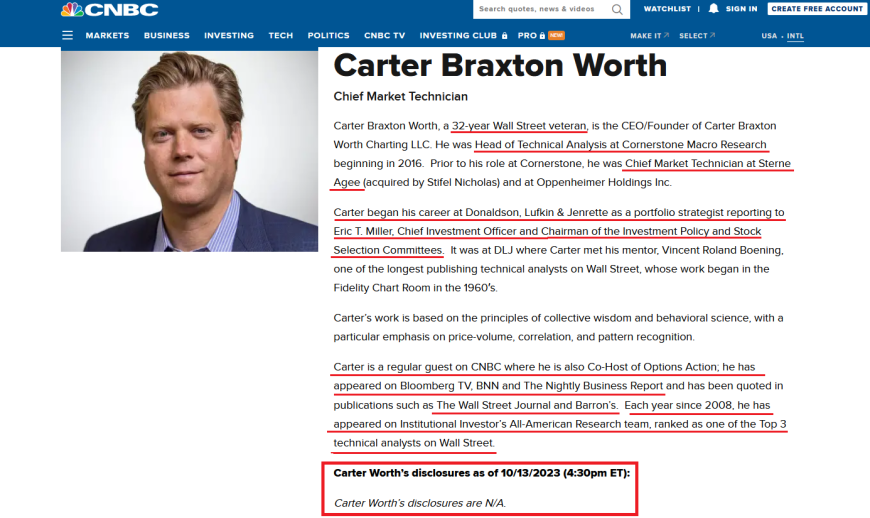
In our opinion, this is a great example of what we would call a puffed up bio.
Quite frankly, we believe Carter Worth to be complete clown.
Based on examination of his bio, it appears that Carter Worth has accomplished nothing positive in his life related to the investment world.
Yet, he's one of the "experts" featured in the financial media.
Let me remind you of a recent video we published on Carter Worth.
We'll let you decide for yourself what to think of Mr. Worth after you listen to his discussion of technical analysis and then check the results of his prediction.
Before you begin, you might already have an initial bias as to whom you're going to go with, Carter Worth or Mike Stathis.
Biases are okay, as long as you're willing to change them when sufficient evidence supportive of your decision materializes.
So, are you going to trust CNBC "expert" Carter Worth?
The fact that he's an "expert" in the media should tell you all you need to know.
If that's not enough to form an opinion about him, remember that he uses technical analysis as his primary (if not only) tool to analyze stocks.
That should be a major red flag.
Let me refresh your memory on another "expert" promoted by the financial media who also uses technical analysis as his only tool to analyze stocks.
Do you remember JC Parets?
No?
Check the links below to refresh your memory.
- JC Parets: The New Investment Expert in the Media
- Kosher Clown JC Parets Teams Up With Kosher Con Harry Dent
- Jewish BS Artists Team Up to Lure Sheep: JC Parets and Harry Dent (2018)
- Clowns JC Parets and Harry Dent Team Up to Pitch More BS to Suckers
- Financial Media Promotes Boiler Room Brokers as Experts (Part 1)
- Yahoo Finance Teams Up with Zero Hedge Scammer Bob English/Jared Blikre
So are you going to go with the insights of what some charting guy says?
Or are you going to trust the insights and recommendations of Mike Stathis?
If you don't already know about Mike's credentials and track record, please click this link.
Listen to Mike Stathis recommendation for Macy's (M) in the video below.
Note that only brief excerpts have been included so as to not give away the details of our research.
After that, you'll hear what CNBC's "expert" Carter Worth, the "chart master" has to say.
We've included Worth's full analysis so you can determine for yourself whether technical analysis can and should be used solely to make investment decisions, and thus whether Carter Worth is a credible source of investment insight.
Irrespective of how clueless Carter always seems to be, the fact is that every media platform which provides him with airtime should disclose his full FINRA record because he's speaking to a very large audience.
If you're being promoted by a large financial network or any other platform with an audience of millions of people, it's important that they know who they are listening to.
If the media fails to disclose all relevant information about its "experts" that should raise a red flag.
If your FINRA record shows a lawsuit for $2,000,000 from a client (with a final judgment award of $800,000) based on allegations of churning and unauthorized trading, that's certainly relevant and should be disclosed by all platforms that give Carter Worth airtime.
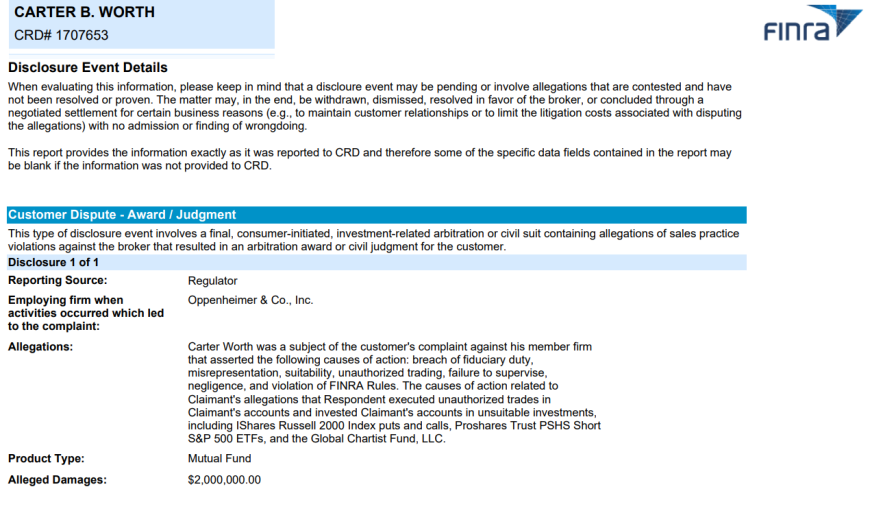
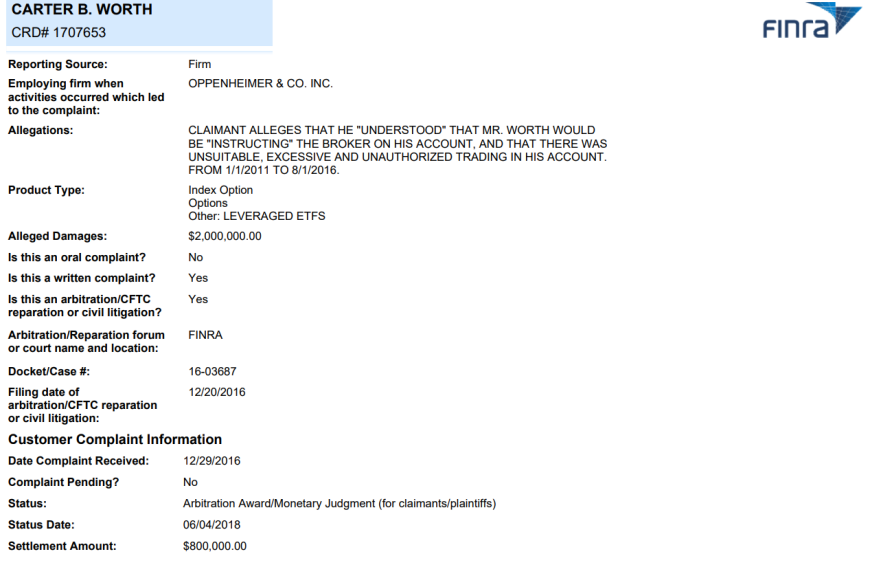
Once you investigate the army of "experts" featured on CNBC, you'll come to realize that most if not all have a shady background at best.
In addition to misleading their audience (often through sheer stupidity, but also many times through intentional deceit) all of these "experts" in the financial media have engaged in questionable activities.
Many of these "experts" have been involved in illegal activities.
And quite a few have even been sanctioned by securities regulators.
- CNBC Trading "Expert" Jon Najarian Promotes "Crypto King" Ponzi Scheme Crook
- CNBC "Expert Trader" Jon Najarian Touts Voyager Digital Before Bankruptcy
- FTX Parasite Promotor and Media Celebrity Kevin O'Leary Caught Lying Again
- Kevin O'Leary's is a Scam Artist and His ETFs Are Terrible and Charge Huge Fees
- Con Artist Kevin O'Leary Breaks Federal Trade Commission Law Again
- "Scam Tank" Con O'Leary Proves He's a Greedy, Dishonest, Incompetent Parasite
- Leading Investment Authority Rips FTX Paid Whore Kevin O'Leary Apart
- Kevin O'Leary Still Promoted as Expert After Partnering with FTX Ponzi Scheme